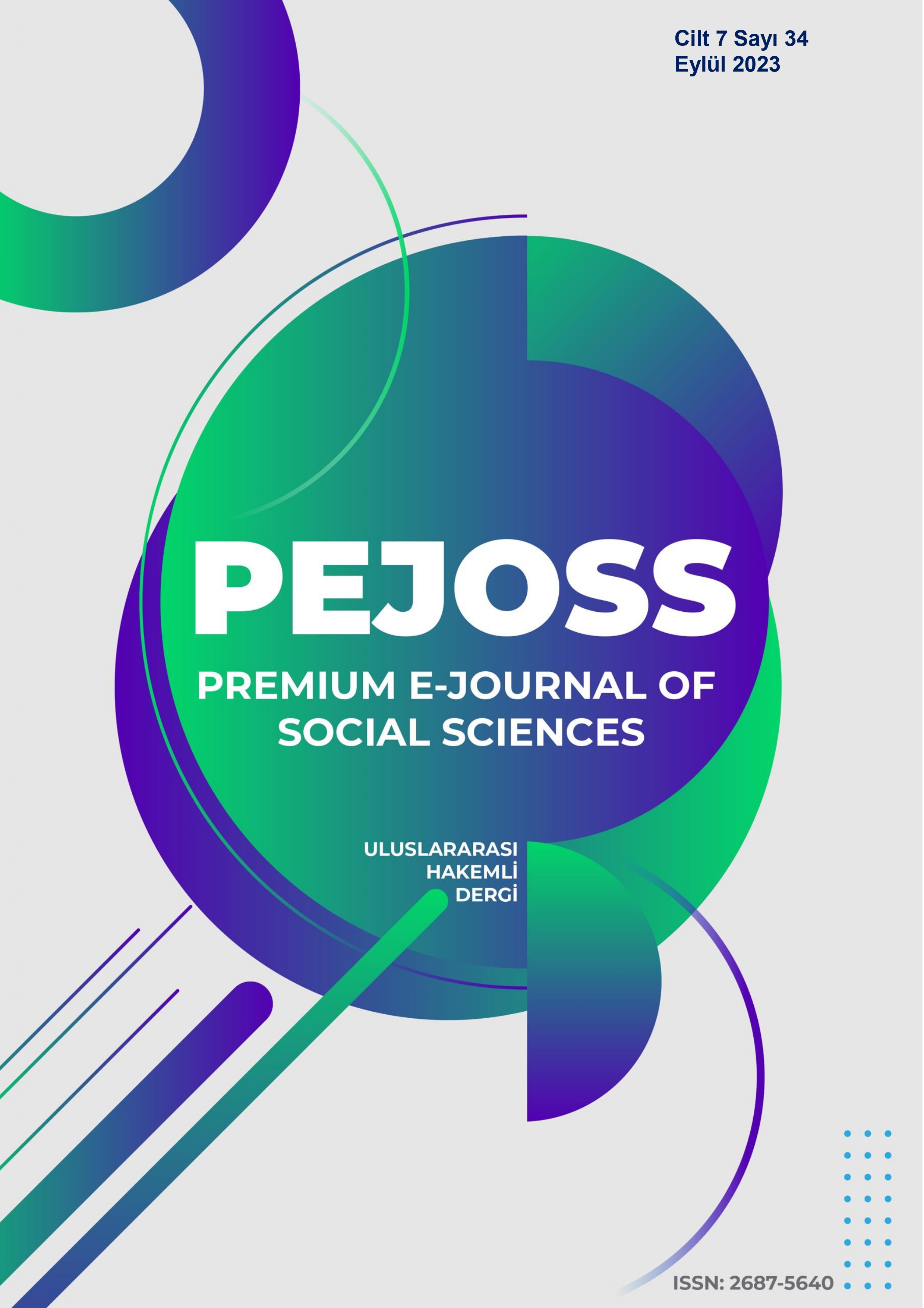Osmanlı’dan Cumhuriyet’e Türkiye’de Avrupa Müziğinin Gelişiminde Fransız Ekolünün Etkisi
DOI:
https://doi.org/10.5281/zenodo.8404821Anahtar Kelimeler:
Osmanlı’da Batı müziği, Osmanlı’da Avrupa müziğinin gelişimi, Osmanlı’dan Cumhuriyet’e müzikte Fransız ekolüÖzet
Osmanlı İmparatorluğu’nda Avrupa müziği ile ilk temaslar 16. yüzyılda Kanunî döneminde başlamış olsa da, bu müziğin Osmanlı’da benimsenmesi ve gelişmesi 19. yüzyılda gerçekleşmiştir. Avrupa müziği ile resmî olarak etkileşim; 1826’da Yeniçeri Ocağını kapatan Sultan Mahmud’un, Mehterhâne’nin yerine Batı tarzındaki Muzika-i Hümâyûn’u 1827’de kurması ile başlamıştır.
Batılılaşma hareketleri, toplumsal hayatın her alanında kendisini göstermiştir. Osmanlı toplumunda değişim ve dönüşüm kültürel ve sanatsal alanı da içine almıştır. Bu süreçte Avrupa müziği, önce saray ve çevresinde sonra da sivil hayatta kalıcı olmuştur. Avrupa müziğinin gelişiminde birçok etkenin yer aldığı görülmektedir.
Bu çalışmada, Osmanlı’dan Cumhuriyet’e Avrupa müziğinin Türkiye’deki gelişimi ve bu gelişim sürecinde Fransız ekolünün etkisi araştırılmıştır. Başlangıçta Donizetti ve Guatelli’nin kumandanlığındaki Muzika-i Hümâyûn’un, İtalyan Ekolü ile yapılandırılması sonrasında Osmanlı’da Avrupa müziğinin gelişimi; Fernando de Aranda, Saffet Atabinen, Paul Dussap ve Enrico Henri Furlani gibi müzik insanları vasıtası ile Fransız Ekolü etkisinde sürmüştür.
Elde edilen bilgilere göre, Osmanlı ve Cumhuriyet dönemlerinde 29 müzik insanının Fransa’da müzik eğitimi aldığı tespit edilmiştir. Bu insanların büyük bir çoğunluğu Devlet bursu ile yurtdışında Batı müziği eğitimi almak üzere Fransa’ya gönderilmiştir. Bazı müzisyenlerinde kendi imkanları ile Fransa’da müzik eğitimi aldıkları görülmektedir.
Bu araştırmada, Avrupa müziğinin Türkiye’deki gelişim sürecinde Fransız ekolünün etkisi tespit edilmeye çalışılmıştır. Nitel bir çalışma olan bu araştırmada; konuyla ilgili kitap, makale ve tez çalışmaları incelenmiş ve elde edilen veriler betimsel olarak analiz edilerek paylaşılmıştır.
Çalışma sonunda, Fransa’da eğitim almış ve çalışmalarını Fransız Ekolü çerçevesinde sürdürmüş olan müzisyenler ile Osmanlı ve Cumhuriyet döneminde Avrupa müziğinin gelişiminde Fransız ekolünün etkisi olduğu düşünülmektedir.
İndirmeler
Referanslar
Akdeniz, H. B. (2017). Batı müziğinin Osmanlı/Türk temsilcileri. Osmanlı Mirası Araştırmaları Dergisi, 4(10), 63-84.
Aksoy, B. (1985). Tanzimat’tan Cumhuriyet’e musiki ve batılılaşma. İçinde Tanzimat’tan Cumhuriyet’e Türkiye ansiklopedisi (C. 5, 1212-1225). İletişim Yayınları.
Alaner, A. B. (2014). Osmanlı İmparatorluğu’nda Çok Sesli Müziğin Gelişimi. Yeni Türkiye Dergisi. (57), 566-574.
Baydar, E. K. (2010). Osmanlı’nın Avrupalı müzisyenleri (1. bs.). Kapı Yayınları.
Boran, İ.,YILDIZ, K. (2010). Kültürel tarih ışığında çok sesli Batı müziği (2. bs.). Yapı Kredi Yayınları.
Daş, M. (2016). Du Loir seyahatnamesi IV. Murad döneminde bir Fransız seyyahın maceraları (1. bs.). Yeditepe Yayınevi.
Gazetesu (t.y.). https://gazetesu.sabanciuniv.edu/sites/gazetesu.sabanciuniv.edu/files/2013/sabanci_ universitesi_20_haziran_idil_biret.pdf
Gazimihal, M. R. (2019). Türk askerî muzikaları tarihi (1. bs.). Doğu Kütüphanesi.
Göher, F. (2016). İslamiyet’ten önce Türklerde kültür ve müzik Hun Kök Türk ve Uygur Devletleri. Ötüken Neşriyat.
İlyasoğlu, E. (2009). Zaman içinde müzik (8. bs.). Remzi Kitabevi.
İnalcık, H. (2020). İmparatorluktan Cumhuriyete (6. bs.). Kronik Kitap.
İnalcık, H. (2021). Rönesans Avrupası Türkiyenin Batı medeniyetiyle özdeşleşme süreci (15. bs.). Türkiye İş Bankası Kültür Yayınları.
İstanbul Üniversitesi Osmanlı Dönemi Müziği Uygulama ve Araştırma Merkezi (t.y.). Darülelhan Tarihçesi, https://osmanlimuzigi.istanbul.edu.tr/tr/content/darulelhan-tarihcesi/hakkinda.
Kalın, İ. (2020). Ben öteki ve ötesi İslam-Batı ilişkileri tarihine giriş (21. bs.). İnsan Yayınları.
Karamahmutoğlu, G. (2014). Tanzimat döneminde müzik dönem padişahları ve müzik anlayışları. Yeni Türkiye Dergisi. (57), 555-565.
Kolukırık, K. (2019). Türk müzik tarihinde Dârü’l-Elhân ve Dârü’l-Elhân mecmuası (1. bs.). Atatürk Kültür Merkezi Başkanlığı Yayını.
Kosal, V. (2014). Osmanlı İmparatorluğu’nda klâsik Batı müziği. Yeni Türkiye Dergisi. (57), 575-589.
Mimar Sinan Güzel Sanatlar Üniversitesi (t.y.). MSGSÜ 2020 - 2021 Akademik Yılı Açılış Töreni https://www.youtube.com/watch?v=d_KEdwphbHQ.
Ortaylı, İ. (2018). Tarihimiz ve biz (15. bs.). Timaş Yayınları.
Özden, E. (2015). Osmanlı Maârifi’nde mûsikî. Türk Tarih Kurumu Yayınları.
Öztürk, O. M. (2009). Türkiye’de müzik olgusunun “müzik” olarak anlaşılmasında ve eğitim alanındaki önyargıların aşılmasında bütüncül yaklaşım gerekliliği üzerine tespit ve öneriler. 8. Ulusal Müzik Eğitimi Sempozyumu.
Solnon, J. F. (2019). Osmanlı İmparatorluğu ve Avrupa. (Çev. A. Berktay). Türkiye İş Bankası Kültür Yayınları. (Orijinal yayın tarihi 2009).
TDV İslâm Ansiklopedisi (t.y.). Batılılaşma https://islamansiklopedisi.org.tr/batililasma#1-giris.
Tunçdemir, İ. (2008). Çoksesli müzikte harika çocuk kanununun Türk müzik kültürüne etkisi: İdil Biret-Suna Kan örneği. Milli Eğitim, (177), 8-27.
Turkish Cultural Foundation (t.y.). Saffet Atabinen http://www.turkishmusicportal.org/tr/besteciler/ detay/saffet-atabinen.
Yalçın, G. ve İde, A. (2019). Osmanlı dönemi meslekî müzik eğitiminde iki solfej kitabı: Solfej ve talim-i kırâat-ı musiki. Türkiyat Mecmuası, 29(2), 645-662.
İndir
Yayınlanmış
Nasıl Atıf Yapılır
Sayı
Bölüm
Lisans
Telif Hakkı (c) 2023 Premium e-Journal of Social Science (PEJOSS)

Bu çalışma Creative Commons Attribution 4.0 International License ile lisanslanmıştır.


